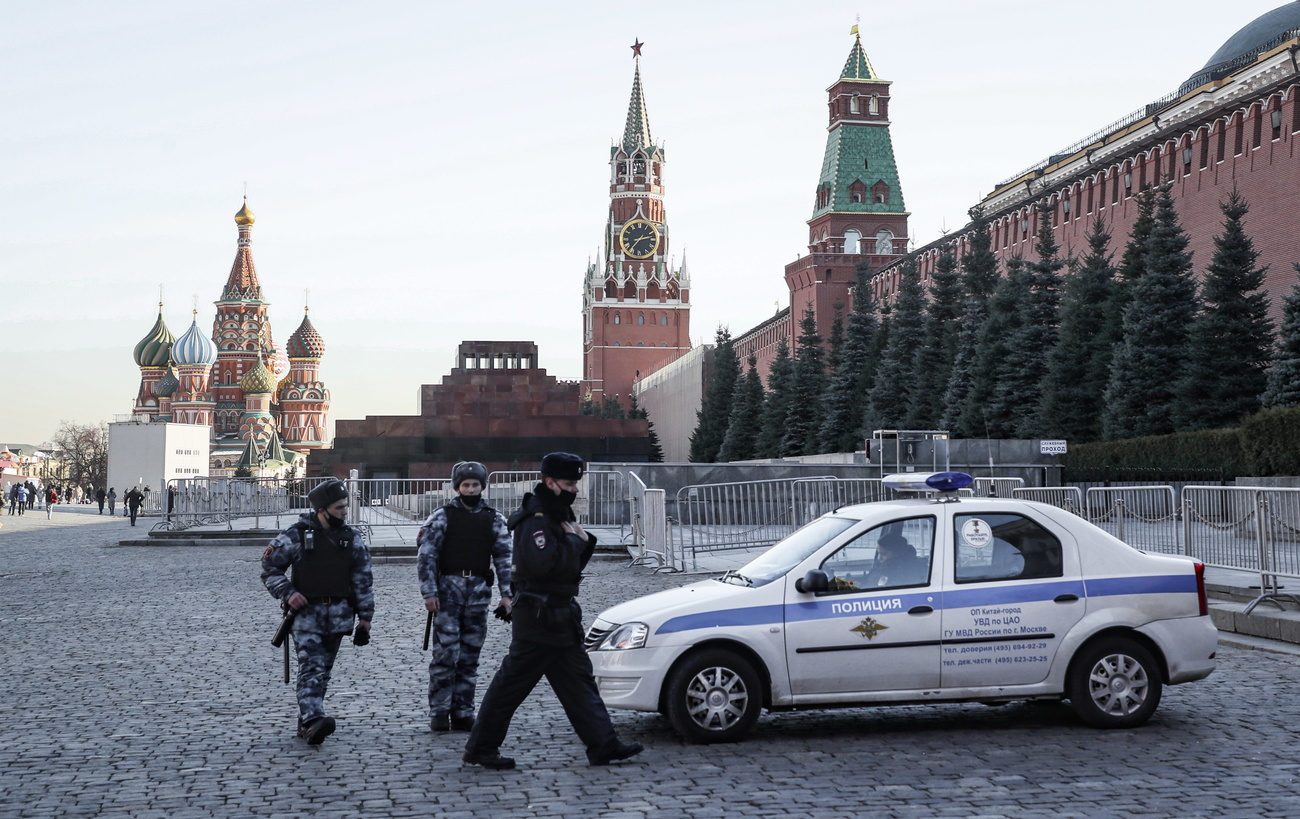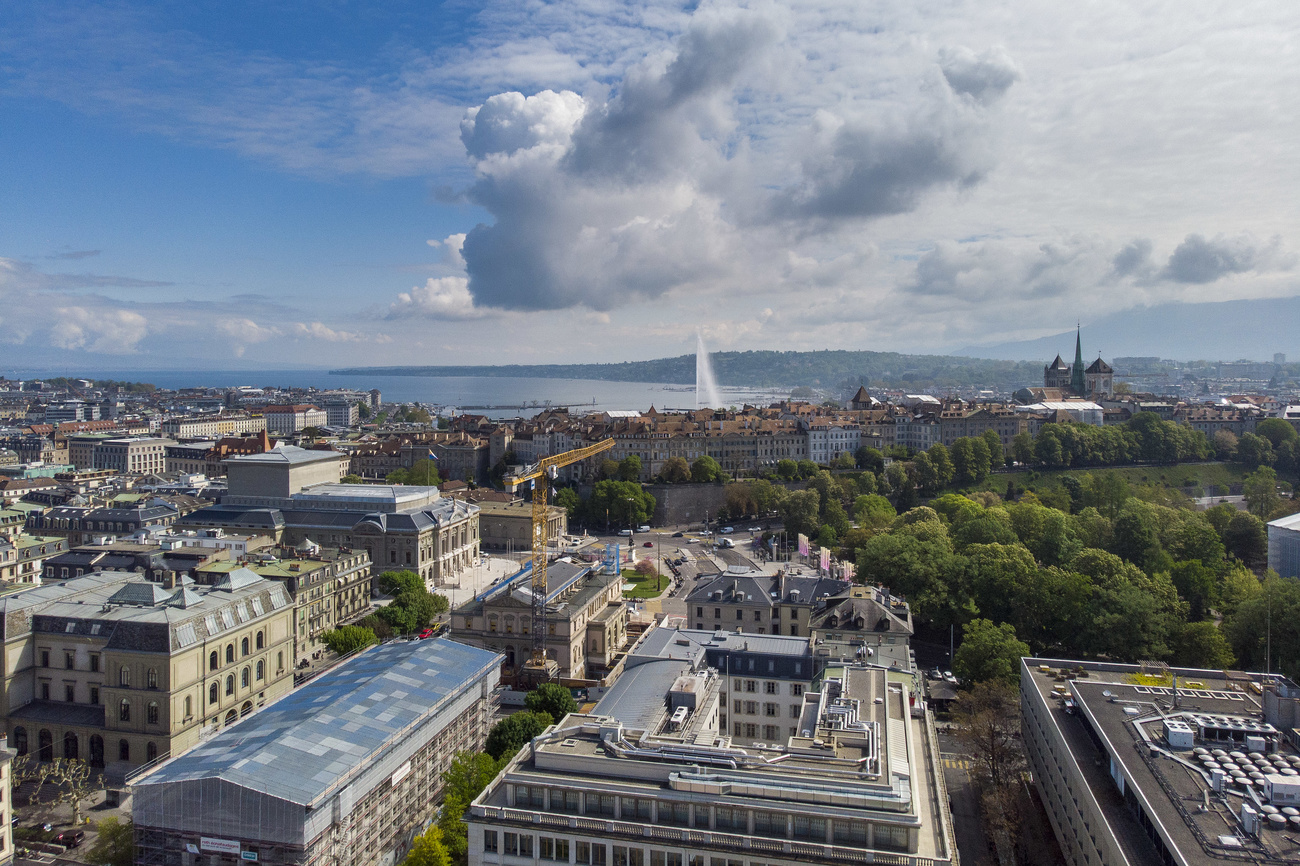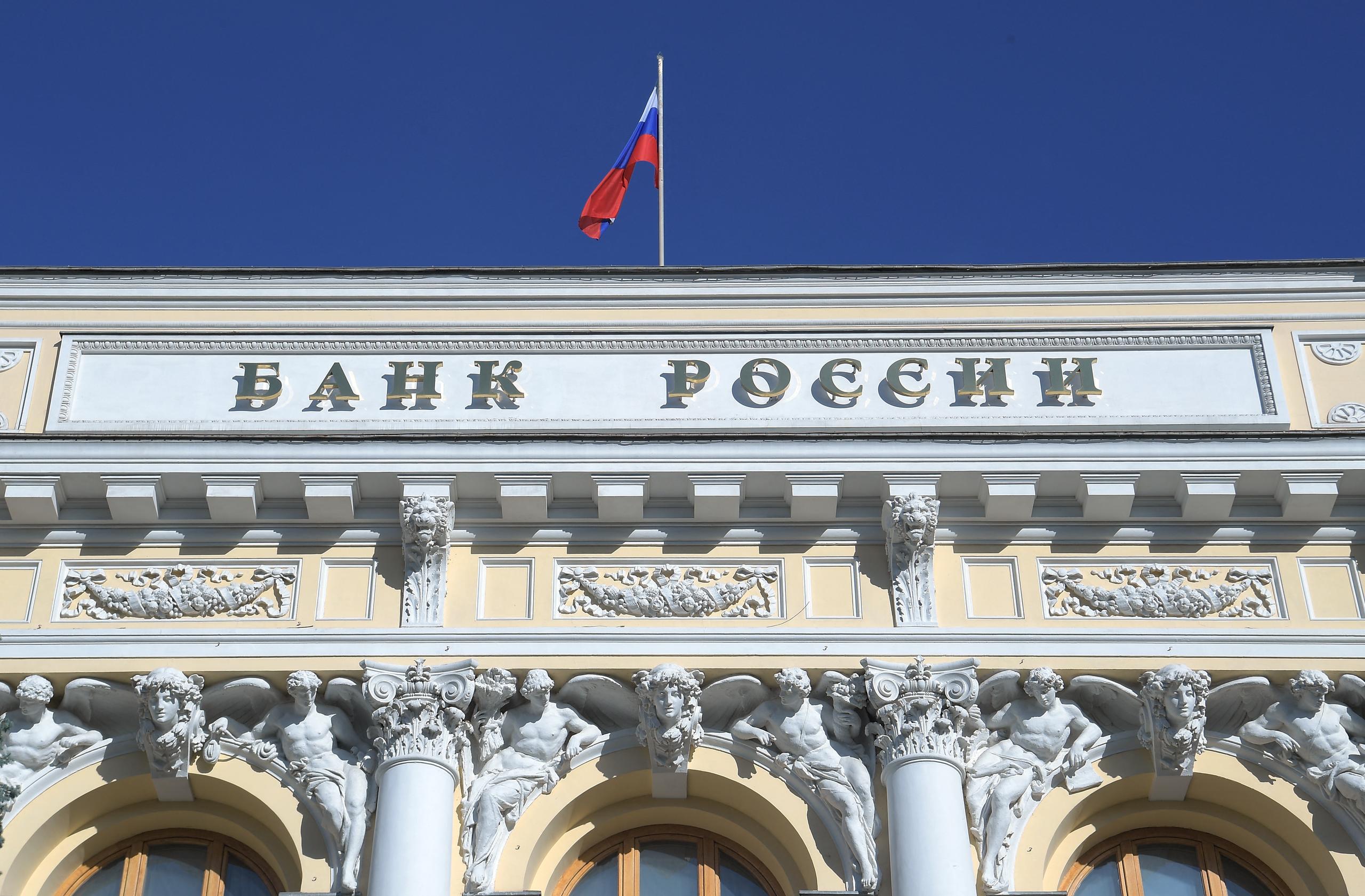Swiss multinationals under pressure to untangle ties with Russia

Swiss companies are distancing themselves from Russia following the deadly attacks on Ukraine and subsequent economic sanctions. However, pressure is mounting for them to disclose and cut ties completely.
On Wednesday, ABB became the first major Swiss industrial company to announce it was suspending business with Russia, Ukraine and Belarus. “As a result of supply chain disruptions and other logistics, ABB has temporarily paused the intake of new orders and all operational activity affected by shipments in and out of Russia, Ukraine and Belarus,” an ABB spokesperson told SWI swissinfo.ch in an emailed statement.
The Swiss engineering group operates two production sites in Russia, which accounts for about 1-2% of ABB Group revenues. The business in Ukraine and Belarus is significantly smaller.
ABB is one of many Swiss companies navigating growing uncertainty and a devastating humanitarian crisis, while ensuring the safety of employees in the region. Following a wave of sanctions intended to isolate Russia, several Swiss companies have announced plans to halt or curb business in the region.
Geneva-based MSC, the world’s biggest container shipping company, said in a customer advisoryExternal link that as of March 1 there was “a temporary stoppage on all cargo bookings to/from Russia, covering all access areas including the Baltics, the Black Sea and Far East Russia”. Swiss logistics company Kuehne und Nagel also announced it was indefinitely suspending all import shipments into Russia, excluding medical and humanitarian supplies.

More
Swiss trading hub adapts to new wartime reality
Exposed sectors
It’s unclear how many companies in Switzerland are affected by international economic sanctions. The Swiss Business Federation (economiesuisse) expects the Swiss sanctionsExternal link announced on February 28 to have only a minor impactExternal link on the export sector. The Swiss government adopted the EU sanctions including freezing assets of individuals and companies in Russia, blocking access to critical technology, and excluding Russian banks from the SWIFT financial messaging service.
Russia is Switzerland’s 23rd largest trading partners with a trade volume of CHF4.7 billion ($5.1 billion). Russia accounts for 1% of Swiss exports and 0.4% of Swiss imports. Ukraine is an even smaller trading partner.
As of June 2020, there were at least 200 Swiss companiesExternal link in Russia registered with the Swiss Business Hub and the Swiss Embassy in Moscow, largely in the pharmaceutical, machinery, watches and services sectors.
Some companies are, however, indirectly affected by sanctions and consequences on markets and supply chains. Martin Hirzel, president of Swissmem, the machine and manufacturing industry association, said at its annual press conferenceExternal link on February 28 that the latest sanctions are a “de facto export ban,” which he supported. Russia’s exclusion from the global banking system SWIFT means “a potential Russian customer would no longer be able to pay the purchase price or down payment owed if bank transfers are impossible,” said Hirzel. He estimates the measures will cost the sector around CHF900 million, which is its share of exports last year.
Mario Ramò, the deputy head of international relations at economiesuisse, told SWI on March 2 that “many companies are unlikely to ‘wait’ for the introduction of sanctions”, and are already identifying their risk exposure in the region.
On Thursday, Solway Investment Group, based in the low tax canton of Zug, announced that it was exiting all operating and investment projects in Russia. Its gold mining project in Russia’s Far East is in the planned closing stage of its life cycle, indicated the Solway press office. The company has operated several mining and metals projects in Russia in the past.
The company’s Pobuzhsky plant in eastern Ukraine, which is the only ferronickel producer in the country and the largest in Europe, is operating at 50% capacity due to the war. Some 1,690 people work at the site. Ore shipments that come from Indonesia and elsewhere to Pobuzhsky from the Yuzhny port have been on hold since February 28 and ferronickel is not being exported because of the war.
Other Swiss companies active in the region told SWI that above all they are concerned about the safety and wellbeing of employees and that they are complying with all international sanctions and are monitoring the situation closely.
Business continuity
The region is particularly important to the Swiss pharmaceutical sector. The supply and delivery of medicines and diagnostics are exempt from sanctions and a Roche spokesperson told SWI that the company is doing “everything we can to maintain supply and delivery within the scope of the available possibilities”.
She added that the companyExternal link is “continuing to monitor the evolving financial situation closely and hope it will be set up in a way that patients in Russia can continue to receive the critical medicines and diagnostics they need”.
A key concern for pharma companies is how the crisis will impact clinical trials in Ukraine and Russia. “Our priority remains to ensure that all patients currently enrolled in clinical trials in Russia and Ukraine continue to get access to treatments,” she said. Globally, there are 251 drugs and devices in clinical trials that have at least one Ukraine site, according toExternal link the US Food and Drug Administration (FDA) clinical trials database. Of these, Roche has the most of any company in Ukraine with 26 clinical trials underway and more than 50 in Russia.
Stronger stance
Even with sanctions in place, pressure is mounting on companies to take a tougher stance in connection with Russia. A growing number of companies have divested from major assets or exited the country entirely, including BP, Shell and ExxonMobil.
In an open letterExternal link, over 400 biotech leaders and investors called on the entire biopharma industry to take action to “make clear our abhorrence of Russia’s actions” and called for immediate disengagement from Russian firms and funds.
Under international law, businesses are not supposed to ‘cause’ or ‘contribute to’ human rights violations and abuses. “With the Russian war of aggression in Ukraine, businesses have the potential to be ‘contributing to’ a large range of serious human rights abuses as well as war crimes,” says Tara Van Ho, a business and human rights lecturer at the University of Essex.
Whether this applies to any single company depends on “how much power and independence they exercise in a particular situation, as well as the steps they take to mitigate the harm, and how they use their leverage to affect Russia’s activities”.
This leverage is difficult to assess though as trade statistics don’t reveal the full scale of the economic links between Swiss companies and Russia. Russian billionaire Viktor Vekselberg, who was put on the US sanctions list in 2018, has been a major investor in several Swiss firms.
Switzerland is also an important trading hub for many Russian and Ukrainian commodities, which according to media reports is a key source of financingExternal link for the Russian state. As SWI reported, international sanctions have not specifically targeted commodities, but some of the big traders have stakes in Russian state-owned companies and projects. Trafigura announced on March 2 it was freezing investments in Russia, and reviewing its stakes in a major Russian oil project.
This has renewed calls to strengthen oversight and accountability of the sector. Swiss NGO Public Eye released a statementExternal link on Wednesday calling for a supervisory authority that would ensure “greater transparency and diligence in a sector that repeatedly plays a role in armed conflicts that is as important as it is opaque”.
Swiss Solidarity has launched a fundraising campaign to help cope with an expected humanitarian crisis in Ukraine. Donations can be paid via postal account 10-15000-6, adding the words “Crisis in Ukraine”.
In a first phase, the money will be used to help refugees in countries neighbouring Ukraine, notably in Poland. Swiss Solidarity works with charities and aid organisations, including Caritas, HEKS/EPER, the Swiss Red Cross, Helvetas, Medair, Médecins Sans Frontières and the Terre des hommes foundation.
If possible and if necessary, aid projects will also be supported in Ukraine.
The money goes exclusively towards humanitarian aid.
Swiss SolidarityExternal link is an independent foundation. It was born from a programme by the French-language public radio and is now the humanitarian arm of the Swiss Broadcasting Corporation, the parent company of SWI swissinfo.ch.

In compliance with the JTI standards
More: SWI swissinfo.ch certified by the Journalism Trust Initiative


You can find an overview of ongoing debates with our journalists here. Please join us!
If you want to start a conversation about a topic raised in this article or want to report factual errors, email us at english@swissinfo.ch.